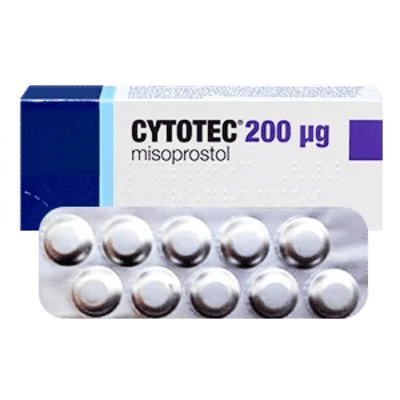I tried Cytotec because I constantly needed NSAIDs to relieve chronic pain. It really helped relieve stomach discomfort and prevented the development of an ulcer. I experienced virtually no side effects, which was very encouraging.

Cytotec
- Quality products
- Support 24/7
- Fast delivery
About this medicine
Cytotec is a medication designed to prevent ulcers in patients taking nonsteroidal anti-inflammatory drugs (NSAIDs), such as aspirin and ibuprofen. The main active ingredient in Cytotec is misoprostol, a synthetic prostaglandin. This substance is naturally produced in the stomach and plays a role in protecting the gastric mucosa from the damaging effects of NSAIDs, which can deplete prostaglandin levels. Cytotec begins to work within 30 minutes of administration and continues to work for approximately three hours, making it effective in maintaining the integrity of the gastric mucosa during chronic NSAID use.
Composition of the medicine
Cytotec is a medication containing misoprostol as its active ingredient. This important component protects the gastric mucosa. The product also contains excipients that promote better absorption and stability of the drug.
- Misoprostol is the main active ingredient, a synthetic prostaglandin that protects the stomach.
- Microcrystalline cellulose is used as a filler and ensures drug stability.
- Crospovidone enhances the solubility and retention properties of the drug.
- Silicon dioxide acts as an anticaking agent.
- Sodium carboxymethyl starch facilitates tablet dissolution in the stomach.
The combination of these components helps Cytotec effectively protect the stomach while minimizing potential adverse effects from NSAIDs.
Usage and dosage
To achieve the best results and minimize side effects, Cytotec should be used strictly according to the dosage recommendations. This medication is for oral administration, and the dosage regimen may vary depending on individual needs and the doctors recommendations.
- The recommended adult dose is 0.2 mg, taken 3-4 times daily with meals for optimal absorption.
- The final dose should be taken before bedtime to provide additional stomach protection overnight.
- In cases where the medication is poorly tolerated, it is recommended to reduce the dose to 0.1 mg to reduce potential adverse reactions.
Also, it is important to remember that taking Cytotec with food may reduce the likelihood of diarrhea, and avoid combining it with magnesium-containing antacids to avoid unwanted interactions.
How does this medicine work?
Cytotecs action is based on its main component, misoprostol, which mimics the action of prostaglandins naturally produced in the stomach. Prostaglandins play a key role in protecting the gastric mucosa by promoting mucus production and reducing acidity. This helps reduce the damaging effects of NSAIDs and prevent ulcers.
Furthermore, misoprostol promotes increased mucosal cell regeneration, further strengthening the stomachs protective functions. As a result, the drugs three-hour duration of action effectively reduces the risk of ulcers with regular NSAID use. Cytotec actively interacts with the gastric lining, providing essential protection and support against conditions of increased acidity and the harsh effects of medications.
Indications for use
Cytotec is indicated for several conditions, particularly when gastric mucosal protection is required while taking certain medications. This medication may be an important component of therapy in patients at risk for developing peptic ulcers.
- Prevention of gastric ulcers in patients taking NSAIDs, such as aspirin and ibuprofen, which can damage the gastric mucosa.
- Strengthening the protective functions of the gastric mucosa in conditions of increased acidity and aggressive drug exposure.
- Reducing the risk of gastric mucosal damage and subsequent ulceration, especially in individuals predisposed to gastrointestinal diseases.
These indications make Cytotec an essential tool in medical practice, particularly for patients regularly using NSAIDs in their therapy.
Contraindications for use
Despite Cytotecs effectiveness, there are certain contraindications for its use that must be considered when prescribing the drug. This helps avoid negative consequences for the patient and ensures safe use.
- This drug should not be used by adolescents under 18 years of age due to a lack of safety data for this age group.
- Pregnant and breastfeeding women should not take Cytotec, as it can cause uterine contractions and lead to miscarriage, birth defects, and premature birth.
- Patients with severe renal impairment should also avoid this drug due to potential health risks.
Adherence to these restrictions is an important step in ensuring treatment safety and preventing potential adverse effects.
Side effects
Side effects are possible with any medication, and Cytotec is no exception. Understanding possible reactions allows patients to be better prepared and seek medical attention if needed.
- The most common side effects include diarrhea, which may occur in some patients taking the drug.
- Nausea and abdominal pain are also common with Cytotec.
- Less common symptoms include skin rash, dizziness, hypotension or hypertension, menstrual cramps, and flatulence.
While most of these side effects are considered mild and temporary, it is important to be aware of them and seek medical attention promptly if they become severe.
Frequently asked questions
Cytotec Reviews and Experiences
My doctor prescribed Cytotec to prevent ulcers, as I take a lot of painkillers for arthritis. The medication is gentle, and although Ive had occasional minor stomach issues, theyve been much less severe than before.
Cytotec has been a real lifesaver for me. I used to often experience stomach issues while taking medications, but this medication has made all the difference. The only thing I had at first was diarrhea, but over time my body got used to it, and now everything is fine.








